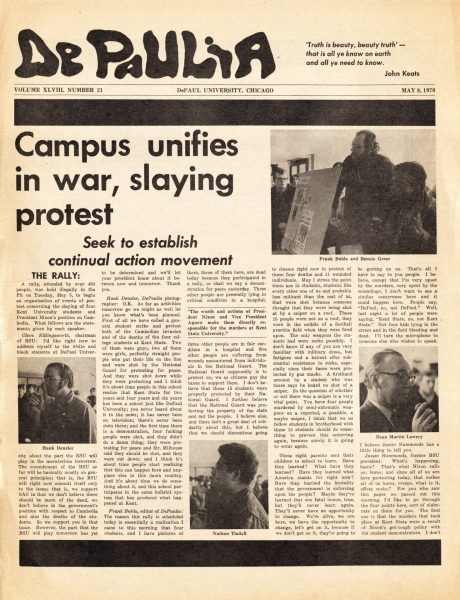Colleges make effort to reduce food waste across campus
Chicago-area colleges tout new programs that are saving their dining- hall food from going to waste. DePaul University students can now take food to-go in boxes that can be composted, and University of Illinois at Chicago (UIC) students will soon get bargains on convenience store food that’s getting old.
That’s important because colleges nationwide are throwing away 22 million pounds of food each year — as much weight as almost 1,700 elephants.
But Chicago schools fail to get much notice in national surveys that judge their programs’ effectiveness.
In fact, no Chicago colleges even ranked in the Princeton Review’s “Top 50 Green Colleges” survey or in BestColleges.com’s survey of the United States’ greenest universities.
They also failed to rank in a survey created by the Association for the Advancement of Sustainability in Higher Education (AASHE). Loyola University Chicago ranked gold for its efforts, despite not ranking among the top sustainable universities within any specific categories. Northwestern University and UIC ranked silver.
“We may not be widely ranked because people don’t know what we’re doing,” said Mark Matijevich, executive chef within DePaul University’s dining services. “It’s not a DePaul initiative. If someone asks the school, ‘What are you doing to reduce waste?’ they might not know what we’re doing back here.”
The university divides its compost stations into four categories: Soup/Salad, Kitchen/Comfort, Bakery and Catering. Those food bins are then further divided into over-production waste, production waste, and unused/out of date inventory.
DePaul also has a computer program called WasteNot that tracks the amount of food waste being produced weekly in order to reduce waste and decrease food cost.
At UIC, representatives say Chicago colleges may rank so poorly because of a city-wide lack of interest in composting, charitable donations and other practices that save food from being thrown away.
“Here at UIC, I don’t feel that students care that much about our sustainability initiatives within the dining center,” said Tracy Dykstra Janecek, wellness and sustainability coordinator. “If the population in the university is more or less apathetic about something, I think that it’s hard to make improvements on that.” One-third of all food intended for human consumption is wasted worldwide, as estimated by the Food and Agriculture Organization of the United Nations.
Food waste is food that is not used for its intended purpose, like an unfinished meal that been tossed in the trash.
“The amount of waste we have [at DePaul] depends on the category,” Matijevich said. That’s because students like macaroni and cheese far more than fruits and vegetables.
“For soup and salad bar, the production waste is super high. I mean, we’re like hundreds of quarts [of waste] during the week just because of the sheer volume of fruit we’re processing,” Matijevich said. “They’re probably doing 150 to 200 quarts a day just to the salad bar, whereas for the kitchen/comfort (food) side, we’re not doing as much cause we’re really using most of the product that we’re getting.”
DePaul’s program aims to predict how much food students will eat.
“We use these programs to forecast, because this helps our food cost, which is our bottom line, too,” Matijevich said.
Menu planning at DePaul might look like this: Matijevich will choose a dish for the day, like pork tenderloin. He then forecasts that 600 students will come to eat that day, and only 200 of them will have pork tenderloin. The cooks will then make 200 servings of pork tenderloin and write down if they ran out or had too much left to make next week’s prediction more accurate.
After dining center staff divides and calculates the weekly waste, they drag compost bins behind the dining center to be picked up by Republic Services, a local waste disposal and trash pick-up service.
Columbia College Chicago says they use similar techniques.
“Columbia College Chicago has implemented a composting program in all of its 14 buildings to help reduce food waste and to encourage a more environmentally conscious campus,” said Anjali Julka, senior manager and editor of Columbia’s News Office, in an email. “This effort includes composting bins in all café areas and composting coffee cup sites in each lobby. Additionally, approximately 12 departments have composting bins in their offices.”
Northwestern says they’ve succeeded at reducing waste because they donate so much of their leftovers and make new meals with unused food.
Leftover food goes to Campus Kitchens, a national student led organization with a chapter at Northwestern, said Georgene Sardis, Compass’ marketing director at Northwestern University.
“[The food waste program is] not a DePaul initiative. If someone asks the school, ‘what are you doing to reduce waste?’ they might not know what we’re doing back here.”
— Mark Matijevich, Executive chef for DePaul's dining services
“Campus Kitchens collects the food, then packages it into individual meals to be distributed to the greater Evanston community,” she said. “For production waste—food scraps/cuttings created during the cooking process—this is often used by our chefs in creative ways such as making soup broths or as garnishes. If it cannot be used for cooking, it is composted.”
The Ozzi reusable to- go container program will also soon be implemented, said Sarah Levesque, dining sustainability manager at Northwestern.
Dining center representatives said that considering the amount of food processed yearly, they believe their colleges are doing pretty well.
“Our recycling coordinator said that last year there was 52 tons of compost collected through 2017,” Dykstra Janecek said. “We go through a lot of food here—we feed a lot of mouths. So I feel like that’s actually pretty good. We really try to reduce waste by trimming as little off of the ends of vegetables as we can, you know, we try to save as much of the food as possible.”
“It’s internal and we don’t really publish it,” said Laura Henning, Chartwells Higher Education Food Services’ marketing manager at DePaul. “I think we actually do pretty good, but people just don’t know about it.”
But they also say they recognize that Chicago colleges have a long way to go before they can consider themselves in the running of most-sustainable colleges in the country.
“Until people that are actually working and managing the situations can improve sustainability, I don’t know if it will spread city-wide,” Dykstra Janecek said.
“I can say all day until I’m blue in the face that I really would like to have compostable greenware, but sometimes if the dollar signs don’t line up with the goals of the program, it just won’t happen because it’s a top down kind of thing. If no one is leading and setting the way, how is it actually going to spread and become effective?”











